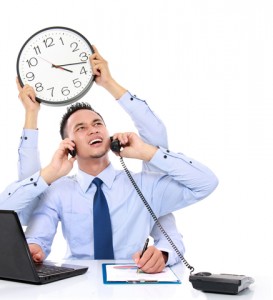“I’m good at multitasking” is a phrase we hear often, but what does it really mean? Multitasking is not only the ability to juggle different things at  once, but it’s also the aptitude to stay organized and on track. Some say that maintaining a balancing act throughout the work day is a productive way to get the job done, while others think that a more streamlined focus yields better results.
once, but it’s also the aptitude to stay organized and on track. Some say that maintaining a balancing act throughout the work day is a productive way to get the job done, while others think that a more streamlined focus yields better results.
Human resources professionals are faced with a variety of tasks in any given day. They must connect with internal hiring managers, read through resumes, and interview candidates, all the while working to maintain the existing company culture. Should these professionals organize their days in large blocks where they focus on one thing, or should they decide to read a few resumes, then move on to another task? I’m on the side of multitasking: In today’s on-the-go, fast-paced climate, you’ll be left behind if you can’t switch between tasks.
In college, I had to go to the library to write my papers, and I forced myself to disconnect from my friends to get work done. I was not a multi-tasker. After working in a high pressure environment, I work well when I can check in and check out of different tasks, and I get bored and distracted if I’m forced to focus on one thing for too long. I have to multitask in order to do my job!
There are some things that I’ve found helpful in my quest to be the best multitasker on Earth, and I hope I can help other HR professionals jump from task to task.
Make checklists
If you have a busy day ahead with piles of resumes to read and a ton of recruiting on LinkedIn, make sure your tasks written down in a to-do list. It’s ok if you bounce between these to-dos, but you’ll have a goal. If you find yourself unsure of what to do at some point in the day, consult the checklist. It will help you re-organize, refresh, and get back in the zone. When the day comes to an end, you can check in to see how well you’ve done.
Stick to a schedule
Sometimes it’s tough to stick to a schedule, especially if an interview runs long or someone talks your ear off for the afternoon. Keeping a schedule doesn’t mean qualifying every minute. It might mean laying out a plan for the day and trying your best to stick with it. For example, you could put a morning of phone screens into your Tuesday plan. If you manage to do a few phone screens, but not as many as you’d hoped because you were interrupted with an urgent matter, it will be ok.
Have an out of office plan
I’m often out of the office. Sometimes I leave for lunch or have to pick my kids up from school. When I leave work during the day, I get anxious about what sorts of issues might be coming in. Not only do I constantly check my email, but I also set up call forwarding through our cloud phone system. When I’m out of the office, I can still make and receive calls. Phew! It’s a life saver when someone important is trying to get in touch.
Limit Distraction
Sure, you might not be able to help it if your boss wants to get in touch, but you can take measures to limit distractions. Remind your friends, family, and coworkers that you’re working and can’t be interrupted. Put your cell phone on silent. Set time aside that’s just for you and your work. Refrain from checking email, unless it’s urgent.
Multi-tasking is an inevitable part of today’s working world, and HR professionals are no exception. You can’t control everything, but if you’re deliberate in your actions, you’ll become an efficient and able multi-tasking pro!
Latest posts by Emma Siemasko (see all)
- Multitasking: Friend or foe? - April 16, 2013












